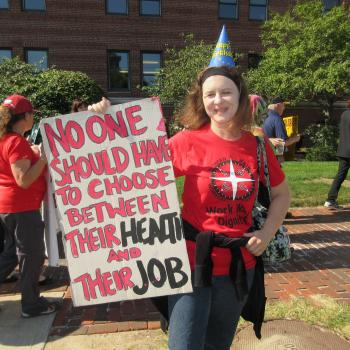Many thanks to Katerina for her excellent post on the science underpinning global warming. What really bothers me about global warming denial is that people feel free to simply ignore the overwhelming consensus of experts, and instead take comfort in the arguments a few contrarians. Would people be so willing to reject the received medical wisdom and embrace some peddler of “alternative healing techniques” on the grounds that the doctors are lying? Hardly, and when one’s health (or the health of one’s family) is in the line, one does not have this luxury, quite frankly.
I confess that I not fully understand why so many on the right (including in Catholic circles) feel engage in this exercise in purest truthiness. I have some conjectures. It could be theological, a potent mix of derivative Calvinism (the belief that the elect are entitled to use the earth’s resources as they see it, and that America is somehow exempt from the responsibilities of other nations) and end times dispensationalism (the belief that the rapture is around the corner, so why worry?). But, when it comes down to details, many global warming deniers point to the economic effects of actions to curb greenhouse has emissions. This is often the crux of the issue.
Now, I could talk a lot about materialism, crass consumerism, and individualism. But the arguments made are (obviously!) a little more subtle. They claim that corrective actions will have disastrous economic consequences that will fall disproportionately on the poor and marginalized. This is a tactic employed by a number of Catholic bloggers (some of whom even assert that the IPCC is peddling lies). Those who push this argument claim (without supportive evidence) that these measures would wreak havoc on the global economy and do immense harm to the welfare of developing countries, leaving millions in poverty. Fortunately, their reading of the economic evidence is as shoddy and selective as their reading of the science. For they ignore completely the most important study to date on the economic costs of global warming and associated policy actions, the UK Treasury-mandated Stern Review.
Here’s the bottom line of this comprehensive report: by not acting, the costs of climate change will eat up 5 percent of global GDP each year, which could rise to 20 percent, taking into account a wider range of risks. In contrast, the cost of reducing greenhouse gas emissions would amount to 1 percent of global GDP a year. The major economic costs go far beyond the inconvenience to the American lifestyle of high gas prices, as “hundreds of millions of people could suffer hunger, water shortages, and coastal flooding”. The most vulnerable, the poorest countries, will suffer “earliest and most”, even though they are least responsible for global warming. Moreover, the next 10-20 years will prove absolutely crucial, rendering little time for complacency. Clearly, the benefits of decisive early action outweigh the costs. So, when you actually get beyond ideology and start getting into empirical issues, the assertions of the deniers are turned completely on their head.
These results are not uncontroversial, however. In particular, the discounting assumptions have been heavily criticized in some quarters. It is customary in these exercises to discount the future simply because it is the future– attaching less weight to the welfare of tomorrow than today. Stern rejects this methodology on ethical grounds. Hence his estimates of the damage caused by global warming are larger, simply because his discount rate is so much smaller.
There is much to like in this analysis from a Catholic perspective. If the true definition of “prudential judgment” is the application of Catholic doctrine to changing concrete circumstances, then the Church has an urgent duty to speak on this topic. And the Holy See observer to the United Nations, Archbishop Celestino Migliore, echoed the Stern Review when he noted that global warming will impose a disproportionate burden on “the poorest and weakest who, even if they are among the least responsible for global warming, are the most vulnerable because they have limited resources or live in areas at greater risk.” He called for a shift from the “heedless pursuit of economic growth” toward an approach more respectful of Creation.
The discounting assumptions underlying the Stern report are also worthy of support from a Catholic perspective, as they do not fall into the utilitarian trap of assuming our lives are worth more than the lives of those not yet born. And, yet, how much of the current global warming denial is motivated by selfishness, by a tendency to heavily discount the future?












